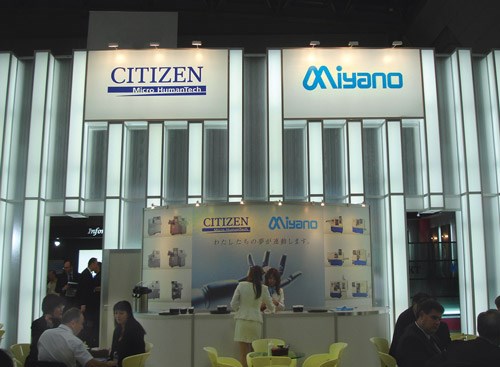Technical Member Profile: Marubeni Citizen-Cincom
Marubeni Citizen-Cincom (MCC) was founded in 1984 to market and service the company’s line of Swiss-type turning centers.
Marubeni Citizen-Cincom (MCC) was founded in 1984 to market and service the company’s line of Swiss-type turning centers. The venture combined two of Japan’s largest and most highly regarded companies—Marubeni Corporation and Citizen Watch Company.
Marubeni began operations more than 140 years ago as a trading company specializing in yarn and textiles. Today, with offices in more than 80 countries, it handles more than 30,000 products, including textiles, chemicals, consumer goods and machinery.
Citizen Watch Company is best known as the manufacturer of high-precision timepieces, but its expertise extends well beyond watches. The company also manufactures computers, LCD screens and office equipment, as well as advanced production machinery. The offering includes the high-precision Swiss-type Cincom (Citizen Numerically Controlled Machines) turning centers.
MCC’s U.S. headquarters are in Allendale, N.J. The company also maintains sales-service offices in Fountain Valley, Calif. and Elk Grove Village, Ill. The three locations support a network of distributors throughout North and South America.
In addition to its Swiss-type equipment, MCC offers fixed-headstock turning centers, CAV bar feeders and Miyano precision lathes. The machines are used to manufacture a broad range of products, including medical instruments, electronics, fiber optics, automobiles, business machines, aerospace components, defense parts, tools, valves and fasteners.
“We specialize in small-diameter bar,” says John Antignani, MCC’s executive vice president. “The Cincom line’s capabilities range from 2- to 32-mm bar. When we added the Miyano line last year, it doubled our capacity to 64 mm.
“We have about 45 percent market share in the U.S.,” Mr. Antignani continues. “Our Number 1 market is general-purpose job shops, which is 35 percent of our business. The second biggest market is medical devices at 25 percent.”
He attributes his company’s success to having trained, certified distributors and providing excellent local customer support. “We take great pride in our distributor network,” he says. “We think our customer support is one of the company’s biggest benefits, along with having the world’s best-recognized brand of Swiss-type equipment.”
Mr. Antignani’s involvement with PMPA goes back to the days when it was known as the National Screw Machine Products Association. “I was invited to speak at an event before I was a member,” he says. “At that time, Swiss machining was considered a ‘black art.’ I became interested in the organization and joined soon thereafter.”
He is a big fan of the annual Precision Machining Technology Show (PMTS), which is held in conjunction with the PMPA Technical Conference. “I like going there because it’s not a tire-kicking event where manufacturers are advertising their products,” Mr. Antignani explains. “Our company is there to present different solutions to machining problems.
“Generally, our equipment is producing something at the show,” he continues. “Or, we will demonstrate something innovative that the audience can use. The people who attend the conference and show are there to learn and see something different.
“PMPA sends us a packet of parts shortly before the Technical Conference,” Mr. Antignani says. “We’ll do a presentation on how to process those parts. We generally spend a lot of time preparing for that. Our people really love doing the presentations.
“We also learn a lot when we go to the conferences,” he adds. “For example, when we demonstrate how we would process a part, someone in the audience might offer a slightly different way of doing it that’s also a great idea. So, it’s both a learning and a sharing experience.
“I like the level of technology and enthusiasm that PMPA brings to our industry,” Mr. Antignani continues. “I think PMPA has done a great job introducing young people to the precision machining industry, but we need to attract even more. At a lot of the shops I visit, our customers say to me, ‘I would buy ten more machines if I could get more qualified operators.’
“The bottom line is there are a lot of jobs available in the precision machined products industry for trained, highly skilled machinists,” he says. “The general public doesn’t know about our industry or the job opportunities. PMPA is trying to spread the word through education. I would like to see more of that. Promoting the precision machining industry is half the battle. The other half is recruiting skilled workers to our industry.
“Offering MCC turning equipment in the U.S. helps our nation be competitive with countries that use ten unskilled workers on one job,” Mr. Antignani adds. “American companies can’t afford to do that, but they can afford the technology to keep manufacturing here. Our products, because they require higher skill levels, are going to keep more of that high-skilled work here in the United States.”
Read Next
Do You Have Single Points of Failure?
Plans need to be in place before a catastrophic event occurs.
Read MoreSeeing Automated Workpiece Measurement in Real Time
User-friendly inspection software for CNC machining centers was shown at IMTS 2024 monitoring measurements between and after machining while performing SPC based on recorded measurement values.
Read More5 Aspects of PMTS I Appreciate
The three-day edition of the 2025 Precision Machining Technology Show kicks off at the start of April. I’ll be there, and here are some reasons why.
Read More











.png;maxWidth=300;quality=90)







.png;maxWidth=970;quality=90)